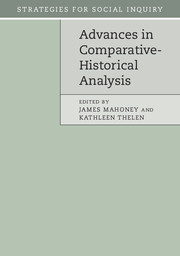Preface
Published online by Cambridge University Press: 05 July 2015
Summary
This volume originated in a conversation in 2010 in which Lewis Bateman of Cambridge University Press expressed interest to James Mahoney in a second edition of Comparative Historical Analysis in the Social Sciences (coedited by Mahoney and Dietrich Rueschemeyer, 2003). The following year, Kathleen Thelen and Mahoney began discussions about a new project along these lines. Although a fresh programmatic statement about comparative historical analysis (CHA) seemed appropriate and much needed, it was also apparent that any new undertaking could not replicate – or even simply update – the earlier book. For one thing, Dietrich Rueschemeyer had retired from sociology, making unavailable the senior leader of the earlier project. Moreover, developments in political science and sociology spoke against following the previous book's approach of simultaneously engaging both disciplines. In particular, the rise of new methodologies and approaches in political science seemed to require a new programmatic statement about CHA focused on political science.
Advances in Comparative-Historical Analysis features original contributions that situate CHA within present-day debates in political science. The book retains the earlier volume's threefold structure – exploring the substantive contributions, theoretical accomplishments, and methodological strategies of CHA. It also follows the earlier book in being a collective effort, bringing together leading CHA scholars who otherwise work in diverse empirical areas. However, the essays in this book cover wholly new topics and tools, and they engage recent and ongoing debates and problems in the field.
To us, this project seemed especially important now because of the excitement surrounding the “revolution in causal influence” currently gripping political science. In recent years, the discipline has witnessed an explosion of interest in the experimental method and a smaller but significant movement advocating the use of “big data.” In light of the growing interest in new techniques for data collection and theory testing, we felt it important to call to mind the ongoing contributions that CHA has made to theory generation the explanation of large and complex outcomes at the macro level – outcomes that newer approaches often shy away from as empirically intractable.
- Type
- Chapter
- Information
- Advances in Comparative-Historical Analysis , pp. xv - xviiiPublisher: Cambridge University PressPrint publication year: 2015

